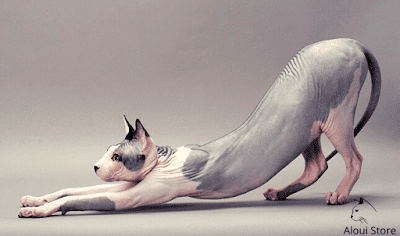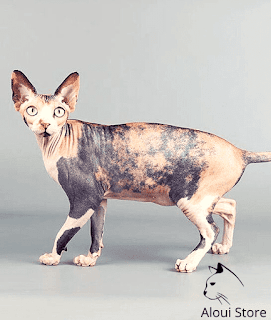Pharaoh cat (Sphynx cats)
The Pharaonic Cat (Sphinx Cats) The Sphinx cats were named after the Egyptian Pharaonic cat because of their elegant appearance and wonderful nature.
And it is considered one of the most expensive cat breeds in the world.
Despite their regal, regal looks, they sometimes act like dogs in terms of fun.
It may seem that they were among the pets raised by the Pharaohs, but in fact, they are originally from Canada.
The pharaoh cat is popular among other pets due to its lack of fur or hair - which is not uncommon among most mammals.
But these cats who do not have any hair on their bodies like to be in sunny places to get warm whenever possible.
They make excellent friends and prefer warmth under the covers with their owners at night.
 |
Sphynx cats |
1-The history of the pharaonic cat
2-Pharaonic cat character
3-Pharaonic cat care
4-Pharaonic cat maintenance
5-Common health problems
Read more: Scottish Fold Cat
1-The history of the pharaonic cat
While the ancient Aztecs raised hairless cats for hundreds of years, the pharaoh cat we know today is actually a Canadian breed that arose in Toronto in 1966 from a random genetic mutation that leads to hair loss.
Some breeders have taken a liking to the hairless cat and decided to breed the breed that largely produces hairless cats.
The breed was originally called "Canadian breed" and has made its way to America and experts have bred cats with this newly found gene to create non-studded cats.
Pharaonic cats are still a popular pet choice in North America and are gaining popularity in Western Europe.
The sphynx breed has been recognized by the International Cat Association in 2005, the Cat Fanciers Association in 2002, and several independent cat clubs in Europe, although breed standards are slightly different.
Some purebred cat records do not know the pharaoh cat, and this may be based on the idea that the lack of hair in the breed is a genetic defect that may be harmful to the cats' health and longevity.
Breed overview
- Country: Toronto, Canada
- Weight: 3-6 KG
- Height: 33 to 38 cm, from head to tail
- Undercoat: without hair
- Layer color: white, black, red, sepia, purple, outline
- Eye color: various
- Life expectancy: 9 to 15 years
 |
| The history of the pharaonic cat |
2-Pharaonic cat character
These cats love to keep themselves entertained for hours at a time, but some may love to have a friend.
If you've been away from home all day, you might want to have two Pharaonic cats. Pharaonic cats get along well with other pets as well.
Read More: Facts about the sand cat
So you can feel comfortable knowing that she will be happy if you have another animal that they can smash in the house, including dogs.
Pharaonic cats love to play, jump, and may once bring their trainers.
Pharaonic cats respond well to training, are social, intelligent, and prefer positive reinforcement.
3-Pharaonic cat care
Pharaonic cats are loyal and full of love for humans, and they can often be pursued around or cuddled as they wag their tails.
Although they always prefer to be cuddling, Pharaonic cats are natural athletes and fun pals who love to play.
Although the pharaoh cat is exceptionally energetic, exercise needs are low.
4-Pharaonic cat maintenance
Despite its hairless look, grooming is an important part of caring for this breed.
Since there is no fur to absorb body oils, the pharaoh's skin should be cleaned regularly to maintain a healthy oil balance, and to prevent skin problems and oil stains on furniture.
Pharaonic cats should be bathed at least once a week to remove oil buildup. It also needs constant cleaning between a large number of creases and folds.
Contrary to popular belief, pharaoh cats are not completely hypoallergenic. They may appear hairless, but these cats are actually covered in a very thin layer that resembles suede.
However, doctors recommend pharaohs as a solution for cat lovers who are allergic to animal hair only, not dander or oil.
Advantages
- The Pharaonic cat is a tender, playful, loyal breed.
- Most pharaonic cats get along well with other cats and dogs.
- People who hate cat hair or cat hair loss will love this hairless breed.
Defects
- Without hair, it is prone to sunburn and cannot tolerate cold temperatures.
- They are not hypoallergenic, and the oils produced by them can cause allergies.
- This breed is prone to cardiomyopathy, as well as skin and dental concerns.
5-Common health problems
Due to its lack of hair, the pharaoh cat is sensitive to exposure to sunlight because it does not contain fur to protect its skin from harmful UV rays.
Read More: Ashera cat
Direct sun exposure should be limited. Just like humans, these cats can get sunburn if they are exposed to the sun for too long.
For this reason, pharaonic cats should be kept indoors or watched closely when outside.
In addition to skin problems, some of the conditions that you may encounter include:
- Hypertrophic cardiomyopathy is a common heart disease that causes the heart muscle to thicken.
- Periodontal disease or gum disorders.
- Genetic impairment, general muscle weakness.
To prevent health problems of the skin and gums, the pharaoh should be cleaned regularly. Weekly baths and tooth brushing will help prevent Pharaonic cats' health problems.
Pharaonic cats love food, they will eat anything you give them. So close attention should be given to feeding them, though.
Sphinx cats have a high metabolism and a sensitive digestive system, so small meals at regular intervals throughout the day are ideal.
Serving food in this way prevents cats from not paying attention to their meals as well.
Dry cat food cleans the cat's teeth and protects the health of the gums, but make sure the Pharaoh cat has plenty of water to drink after a meal to prevent dehydration.
More strict cat chews can also be found at your local specialty pet store and they do well to promote gum health.
Some Sphinx cat owners choose a raw diet and claim numerous health benefits.
Experts suggest a rotating diet for raw fish, such as tuna or sardines, in addition to canned and moist cat food.
And if you like the content, please share it with friends so that the benefit prevails.
You have all my love and appreciation, and do not forget to subscribe to the blog to receive everything new so that you will be the first to benefit.
See you with another breed.